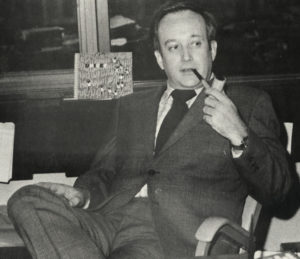
H. Floyd Dennis Jr., professor of special education, emeritus, at Vanderbilt Peabody College of education and human development, died April 17 of cancer in Chattanooga, Tennessee. He was 89.
A nationally renowned legal theorist, activist and prolific scholar, Dennis helped expand the civil rights of children and adults with intellectual and developmental disabilities in Tennessee and throughout the U.S. He was a major early promoter and organizer of community services for persons with intellectual disabilities, and worked tirelessly to improve their inclusion in our communities and their access to equal protection under the law.
From 1961 to 1967, the former state senator served as special legislative analyst to the Tennessee General Assembly, assistant attorney general for the 8th and 23rd judicial courts, special counsel to the Tennessee Limited Constitutional Convention, and director of the Tennessee Criminal Law Revision Commission.
In 1967, Tennessee Gov. Buford Ellington asked Dennis to investigate and report on the status and needs of Tennessee’s citizens with intellectual disabilities. His resulting plan for Tennessee, a seminal policy document that was one of the first comprehensive state plans for this vulnerable population, was used as a model by several other states.
Dennis championed what is now the principles of community integration and inclusion—the commitment that persons with intellectual and developmental disabilities should be included in our families, schools, workplaces and communities just as all other citizens are included. He helped formulate and pass both Tennessee’s Right to Education law and its federal counterpart, the Education for All Handicapped Children (now IDEA), both of which guarantee children with disabilities the right to a free and appropriate education in the least restrictive environment.
He either acted as a founding principal of, or secured funding for, virtually every community-based program for people with intellectual disabilities in Tennessee and served as counsel or expert witness in multiple landmark federal cases.
At Peabody College, Dennis served several years as chair of the Department of Special Education, which is consistently ranked as the nation’s preeminent program in that field. As a researcher in the Vanderbilt Kennedy Center—then the John F. Kennedy Center for Research on Education and Human Development at Peabody College—he was founding director of the Kennedy Center Institute on Youth and Social Development. He formulated the concept of “county agents for children,” a forerunner of such present-day programs as Court Appointed Special Advocates, which recruits citizens to act as unpaid voluntary advocates for people with intellectual disabilities or mental health disorders.
Dennis served on both the President’s Committee on Intellectual Disabilities and as an official delegate of the White House Conference on Children.
He is survived by his second wife (his first having preceded him in death); two sons, including John M. Dennis, BE’76; a daughter, Tricia Dennis Mustafa, MEd’83; three grandchildren and a great-grandson.
—JAN ROSEMERGY